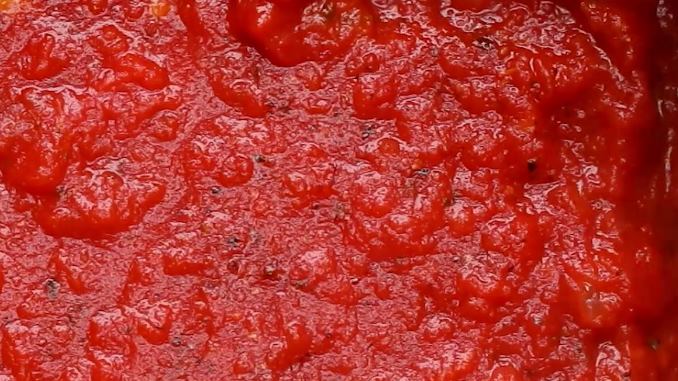Thick tomato sauce is a great way to preserve your fresh tomatoes for later use.
You can also freeze it or can it, but if you are going to do either of those things, you need the right base. Here are some simple steps on how to thicken tomato sauce for canning.
Let’s take a look.
How to thicken tomato sauce for canning?
- You should be canning tomato sauce that is not seasoned. It is a good idea because you can use it in many recipes.
- Start by boiling the tomatoes for a few minutes. Use medium heat and stir often to prevent burning. The thicker your sauce, the more you will have to stand there and stir for a long time until it gets done cooking.
- If you want to can your sauce, you can do so right after it is hot and bubbly. If you want your sauce to be thicker, then cook it down.
- Cook until the consistency that you like is reached. Stir often so that the sauce does not burn. The overall amount could be reduced by half by now, but it’s OK.

Can you thicken tomato sauce before canning?
Yes, you can thicken it before canning. If the tomatoes used were meaty and your sauce is thick, just keep stirring. Otherwise, cook it down for a few minutes to make it thicker.
Can you thicken tomato sauce with cornstarch before canning?
Do not add thickener before canning. People often question if they can thicken salsa or tomato soup with flour, cornstarch, rice, pasta, or cream before canning. NEVER do this.
Do you have to add lemon juice when canning spaghetti sauce?
When canning tomatoes, you must add lemon juice to the tomatoes. It is important to acidify the tomatoes when home canning them. You can use bottled lemon juice or citric acid.
What happens if you forgot to put lemon juice in canned tomatoes?
Your canned sauces might go bad sooner than you expect if you forget to do this.
You will need to add lemon juice or citric acid to canned tomatoes. Adding this will lower their pH so that the tomatoes are safe for boiling water bath canning.
This is important because some people might forget and not put enough of it in. Tomatoes should be acidified whether you use a boiling water bath canner or a pressure canner.
How do you thicken a sauce for use?
Add cornstarch slurry. To make the slurry, mix one part cornstarch and one part water. Add it slowly so it doesn’t change the taste of your sauce.
How can I make canned tomato sauce better?
If you want to make things better, add extra virgin olive oil and fresh garlic. You can also add meat and hot pepper flakes.
If you want to use red wine, just remember to simmer it for about ten minutes with the sauce. Finally, you can add cheese or cream and butter.
Do I need to add salt to canned tomatoes?
This is not necessary for preservation. But it can be added for flavor. You can try 1 teaspoon is enough per quart.
Why is my canned tomato sauce watery?
It is watery because the natural water in the tomatoes gets out during processing. You should boil the mix for extra time so the liquid evaporates more. That way, your sauce should be much more thickened.
Does lemon juice change the taste of canned tomatoes?
Yes, taking canned tomatoes and adding lemon juice to them changes the taste a little bit. If you want the flavor to change more, add the cider vinegar.
You should test your canned tomatoes after 4-6 weeks to see if they have a good flavor before serving them for a party or other event.
What happens if you don’t put lemon juice in canned tomatoes?
If you don’t put lemon juice in canned tomatoes, they will still be safe to eat.
This is because people have been making canned tomatoes for many years without adding lemon juice. Lemon juice is added to give the food more acidity and to increase the safety of the food.
The USDA started recommending this after they realized that some newer types of tomatoes (like yellow ones) are lower in acid than others.
Do pressure canned tomatoes need lemon juice?
Yes, if you make pressure canned tomatoes, you should add lemon juice or citric acid or vinegar. It’s for safety.
Why did my canned tomatoes turn brown?
Canned tomatoes turn brown because of oxidation. To prevent this, submerge the fruit in a bowl of water with some lemon juice while you’re preparing them for cooking.
